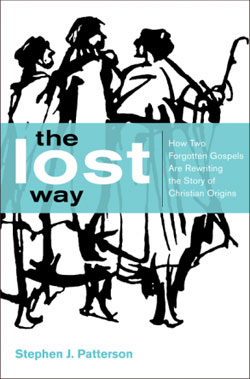
One of the first assignments in my New Testament class at Wheaton College[1] involved photocopying portions of Matthew, Mark and Luke and then highlighting in various colors the verses that each shared with the others—green for passages that appeared in all three, blue for passages that appeared only in Matthew and Luke, red for passages that appeared only in a single Gospel, and so on.
When completed, the rainbow of highlighting revealed an interesting conundrum: what exactly is the relationship between these texts? Which Gospel came first? Which borrowed from the others? And, most intriguingly, what earlier sources might all of the canonical Gospels be drawing upon?
The most widely accepted answer to this last question—known as the synoptic problem—is the so-called Two-Source Hypothesis, which posits that Mark was written first, and that Matthew and Luke then both used Mark to develop their narratives. The hypothesis further asserts that, in addition to Mark, the later Gospels also drew upon a collection of Jesus’ sayings that scholars refer to as Q.
Q is an entirely hypothetical text, derived from the shared material in Matthew and Luke that is absent from Mark. We don’t have any extant manuscripts of Q, nor do we have any direct references to it in the New Testament or in other early Christian writings. But the preponderance of textual evidence supports its existence, and scholars have devoted enormous effort to reconstructing the text that Q likely contained.
 One of these scholars is Stephen J. Patterson, whose new book, released today, The Lost Way: How Two Forgotten Gospels Are Rewriting the Story of Christian Origins (HarperOne, $26.99), explores the origins, context, text and interpretation of the Q Gospel, along with another early non-canonical Christian document, the Gospel of Thomas.
One of these scholars is Stephen J. Patterson, whose new book, released today, The Lost Way: How Two Forgotten Gospels Are Rewriting the Story of Christian Origins (HarperOne, $26.99), explores the origins, context, text and interpretation of the Q Gospel, along with another early non-canonical Christian document, the Gospel of Thomas.
While Patterson readily acknowledges the controversy and uncertainties that have long attended both Q and the Gospel of Thomas, he also argues forthrightly for their roles as foundational pieces of Christian literature. For Patterson, both documents shed valuable light on a period of Christian history that remains largely shrouded from direct view.
It would be a disservice to present in too cursory a fashion the bare conclusions at which Patterson arrives; he does, after all, spend the time necessary to explain how and why he arrives at his positions.
Nevertheless, I’ll cut to the chase: Patterson believes the evidence of Q and Thomas reveals an earlier Christianity in which Jesus was not an apocalyptic prophet, and certainly not the divine Son of God, but was instead an itinerant “wisdom teacher,” a traveling sage whose koan-like sayings are preserved in these earliest Gospels.
According to Patterson, the earliest Jesus—the Jesus of the pre-New Testament Gospels—didn’t preach an eschatological [read: concerned with endings] message. Jesus, in other words, wasn’t focused on escaping from the strife of the world. His teachings centered on the here and now, on a kingdom that could be found right here on earth through seeking a life of peace, love and compassion. The Jesus revealed in Q and Thomas encourages his followers to find truth and justice from within themselves, rather than waiting for the apocalyptic return of a Messiah.
Through his reconstruction, translation and interpretation of Q and Thomas, Patterson attempts to peel back the layers of historical Christian theology that he feels have clouded Jesus’ original message.
But in doing so he leaves some pertinent questions unanswered. Why should these later layers of historical Christian theology be discarded? Why should we view the theological developments and perspectives reflected in the canonical Gospels as superfluous fluff rather than meaningful and important expositions of Christian understanding?
When I’m chopping an onion for homemade spaghetti bolognese, I’ll always peel off and discard the first few outer layers of the onion. The important part of the onion–the sharp, spicy, flavorful part–is contained throughout the remaining layers. Unfortunately, Patterson, in his race to the core—in his race to essentially canonize Q and Thomas at the expense of the canonical Gospels—discards virtually the entire onion. He summarily glosses over historical Christian theology in search of the “original” words of Jesus–words that, despite his careful work, still consist almost entirely of speculation and conjecture.
Were I to follow Patterson’s lead in creating my spaghetti sauce, it would perhaps be a purer, “truer” sauce, but it would also be a bland and watery affair, devoid of depth and flavor.
How much truth do the reconstructed text of Q and the scant manuscript evidence of Thomas actually provide? What is their significance to our understanding of Christianity today? These are theological as well as historical questions that scholars will continue to debate. (See for example, this discussion of Simon Gathercole’s recent paper Jesus, the Apostolic Gospel and the Gospels.)
Regardless of how one ultimately understands the roles of Q and Thomas in relationship to mainstream Christianity, they certainly contain nuggets of wisdom that are worth both discerning and pondering. If we are willing to look to modern pastors, teachers and scholars for new understanding and insight into Christianity–as we are, and as we should always be, and have always been–then we should also be willing to look to the very earliest texts–or even intimations of the earliest texts–of Christianity for wisdom and insight into the Christian faith. Thankfully, through the work of Patterson and other scholars, we continue to be able to do so.
As Patterson translates Thomas 2:1-3:
Jesus said, “Let all who seek seek until they find, and when they find, they will be disturbed, and when they are disturbed, they will marvel, and they will rule over the universe.”
Find out more about The Lost Way: How Two Forgotten Gospels Are Rewriting the Story of Christian Origins and read an excerpt from the book at Harper Collins.
- ^ More on this blog concerning Wheaton: Something Needs to Change Here; “Queers in the Kingdom” shares the stories of LGBT students at Wheaton College.
 Dan Wilkinson
Dan Wilkinson
Dan is the Executive Editor of the Unfundamentalist blog. He is a writer, graphic designer and IT specialist. He lives in Montana, is married and lives with two cats.
Leave a Reply